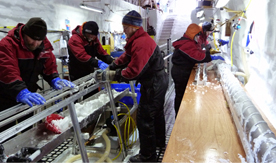
Climate Change Institute Involved in Successful Recovery of a New Deep Ice Core from Antarctica
A team of scientists from nine nations, which included two University of Maine graduate students, has made a breakthrough in Antarctica — successfully drilling more than 760 meters through the ice to bedrock on an island in the Ross Sea.
The international team, led by Nancy Bertler, Victoria University’s Antarctic Research Centre and GNS Science in New Zealand, completed the drilling on Roosevelt Island in late December when the drill bit brought sediment up from the base of the ice sheet.
The drill cores from the Roosevelt Island Climate Evolution project will provide the most detailed record of the climate history of the Ross Sea region for the last 30,000 years — the time during which the coastal margin of the Antarctic ice sheet retreated following the last great ice age, says Bertler, who is an adjunct faculty member in UMaine’s Climate Change Institute (CCI).
Graduate students Skylar Haines and Tom Beers of the Climate Change Institute and the School of Earth and Climate Sciences each spent several months working in Antarctica on the ice core drilling project as part of their master’s research. Now they will work under the direction of Climate Change Institute Director Paul Mayewski and Research Associate Professor Andrei Kurbatov to develop highly detailed reconstructions of past climate in CCI’s W.M. Keck Laser Ice Facility.
Core analysis could help determine the stability of the Ross Ice Shelf and West Antarctica.
“With the success of the deep ice drilling at Roosevelt Island, Antarctica, we have the ice core material necessary to make significant insights into the past, current and future behavior of the West Antarctic ice sheet — one of the greatest potential contributors to future global sea level rise and one of the major controls on Southern Hemisphere climate,” Mayewski says.
More information about the Roosevelt Island project is online.
